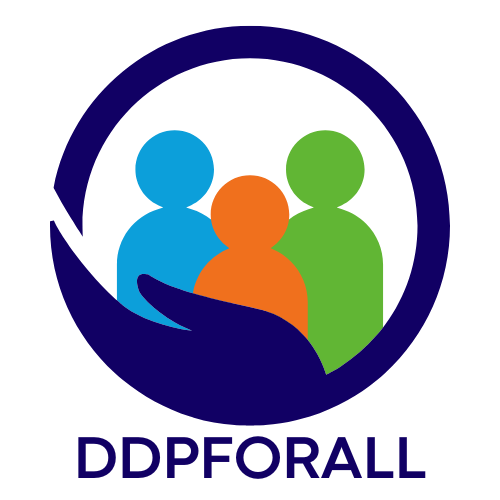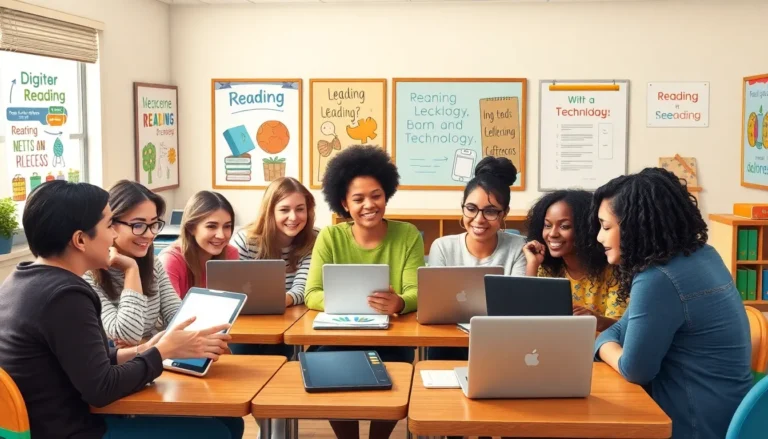Table of Contents
ToggleIn a world where the written word reigns supreme, mastering reading and literacy can feel like wielding a superpower. Imagine transforming struggling readers into confident bookworms, all while earning an online master’s degree that fits snugly into your busy life. It’s like being the superhero of the literary realm—cape optional!
Online master’s programs in reading and literacy aren’t just about hitting the books; they’re about unlocking potential. With flexible schedules and engaging coursework, aspiring educators can dive deep into the world of literacy without sacrificing their sanity or social life. Whether it’s decoding the mysteries of phonics or exploring the latest in literacy technology, these programs equip graduates with the skills to make a real difference. So why not turn that passion for reading into a career that inspires others?
Overview of Online Masters in Reading and Literacy
Online master’s programs in reading and literacy focus on developing essential skills for educators. Courses cover phonics, literacy technology, and instructional strategies. Graduates receive training to support diverse learners, particularly those facing reading difficulties.
Flexibility remains a key advantage of these programs. Students can access coursework anywhere, making it easier to pursue a degree alongside personal commitments. Programs emphasize a blend of theoretical knowledge and practical application, ensuring that candidates are prepared for real-world classroom challenges.
Accredited institutions provide these master’s degrees, granting credibility and recognition in the educational field. Faculty members often include experienced educators who share valuable insights and expertise. Networking opportunities arise through collaboration with peers and faculty, fostering professional growth.
Nationally recognized curricula guide program development, incorporating current research and best practices in literacy education. Recent studies show that highly qualified educators significantly improve student reading outcomes. Data indicate that teachers trained in reading and literacy practices are more effective in addressing diverse learning needs.
Job opportunities expand for individuals with online master’s degrees in reading and literacy. Positions often include literacy specialists, reading coaches, and curriculum developers. The demand for qualified educators in literacy continues to rise, highlighting the importance of these programs in today’s educational landscape.
Benefits of Pursuing an Online Degree


Pursuing an online master’s degree in reading and literacy offers numerous advantages that cater to modern learners.
Flexibility and Convenience
Online programs provide flexibility that traditional education often lacks. Students can schedule classes around personal or professional commitments, making it easier for them to balance work and studies. Learning materials are accessible anytime, allowing for a personalized study pace. This convenience fosters a more manageable approach to education and often leads to increased academic success. Many programs emphasize asynchronous learning, enabling students to engage with the coursework when it suits them best.
Accessibility for Diverse Learners
Accessibility in online education removes barriers for diverse learners. Geographic limitations diminish as students can enroll in programs from accredited institutions across the country. This inclusivity ensures that individuals from various backgrounds can pursue advanced degrees. Different learning styles are accommodated through digital formats, catering to visual and auditory learners alike. Adaptive technology utilized in these programs further supports those with specific learning needs. Enhanced accessibility ultimately promotes a rich learning environment, benefiting all students.
Curriculum and Course Offerings
The curriculum for an online master’s in reading and literacy encompasses core competencies essential for effective literacy instruction. Programs integrate contemporary strategies and technologies to address the diverse needs of learners.
Core Courses
Core courses typically focus on foundational literacy principles such as phonics, comprehension strategies, and assessment techniques. These courses prepare educators to identify struggling readers and implement targeted interventions. Research methods in literacy also form a key component, allowing graduates to analyze effective practices. Instructional strategies for diverse learning environments equip educators to create inclusive classrooms. Program designers emphasize practical applications, ensuring that students can translate theory into practice.
Specializations and Electives
Specialization options often include literacy leadership, reading intervention, and digital literacy. Students may choose electives that align with their career goals, such as children’s literature or adult literacy programs. These specialized courses encourage depth of knowledge and proficiency in specific areas. Integrating technology into literacy instruction also features prominently, showcasing its importance in modern education. Many programs provide opportunities for hands-on experiences through practicum or capstone projects, allowing students to apply their learning in real-world settings.
Accreditation and Program Quality
Accreditation plays a crucial role in determining the quality of online master’s programs in reading and literacy. Recognized bodies, such as the Council for the Accreditation of Educator Preparation (CAEP), evaluate institutions on rigorous standards. Graduates from these accredited programs benefit from enhanced job prospects because employers often prioritize candidates from accredited schools.
Program quality often revolves around faculty qualifications. Experienced educators frequently teach online courses, sharing valuable insights and real-world applications. This connection between theory and practice enriches the educational experience for students.
Curricula must align with current research and best practices, ensuring that graduates are well-prepared to address modern literacy challenges. Programs typically include core courses covering phonics, comprehension strategies, and assessment techniques. Specialization areas, like literacy leadership, cater to diverse student interests, supporting tailored learning paths.
Hands-on experiences serve as another hallmark of program quality. Practicum opportunities enable students to apply their knowledge in real classroom settings, bridging the gap between theory and practice. Capstone projects require students to demonstrate their learning outcomes, reinforcing confidence in their skills.
Networking opportunities also support career advancement. Collaboration with peers fosters connections that prove invaluable in professional environments. Students can engage in discussions, share experiences, and collaborate on projects, further enhancing their education.
Flexibility remains a significant advantage of online programs. Accessible coursework allows students to balance their studies with personal commitments, ultimately promoting a diverse cohort of learners. This inclusivity enriches discussions and broadens perspectives, contributing to a comprehensive learning experience.
Career Opportunities After Graduation
Graduates of online master’s programs in reading and literacy access diverse career paths, particularly within education and other fields.
Roles in Education
Positions such as literacy specialists focus on improving students’ reading skills. Many graduates serve as reading coaches, guiding educators and students through effective instructional strategies. Curriculum developers play a vital role in creating engaging literacy materials aligned with current research. Additionally, roles in educational leadership, such as literacy leaders, offer opportunities to influence literacy policies and practices within schools and districts.
Alternative Career Paths
Educators explore careers beyond traditional classroom settings. Nonprofit organizations often seek literacy advocates to promote reading initiatives in communities. Educational technology companies value expertise in literacy to enhance digital learning tools. Publishing firms hire graduates to develop literacy-related content, which can include textbooks and supplementary reading materials. Some graduates also choose to pursue roles in research, contributing to studies focused on literacy development and instructional methods.







